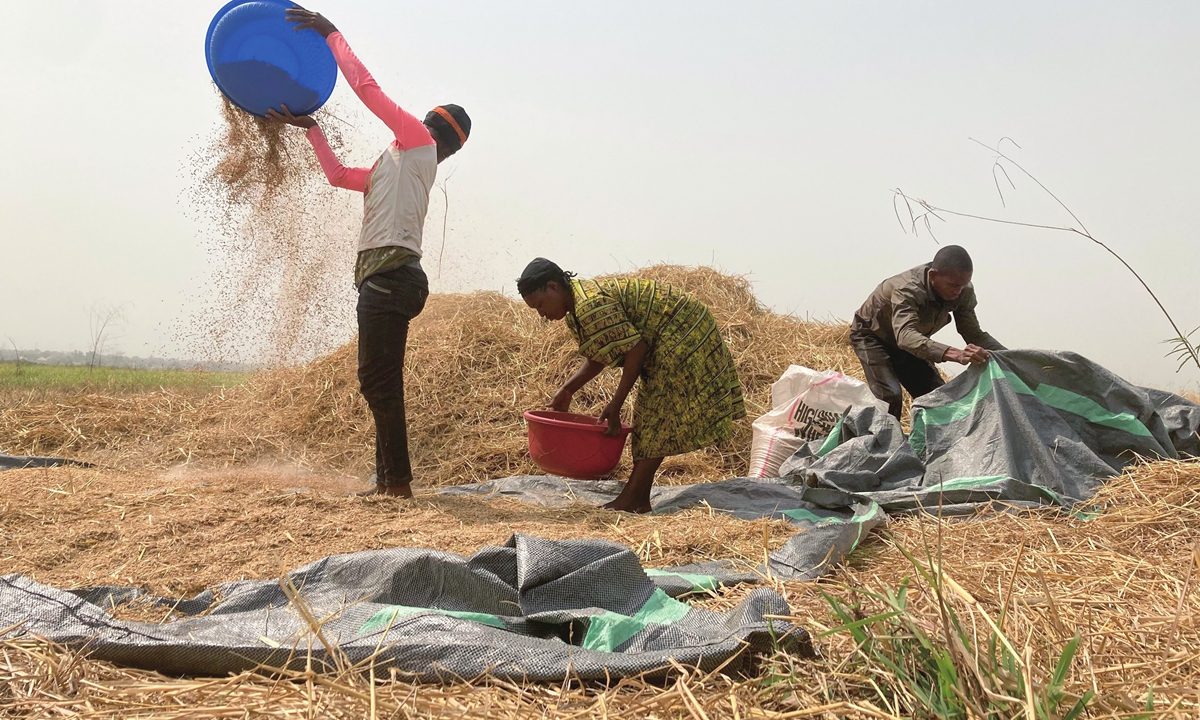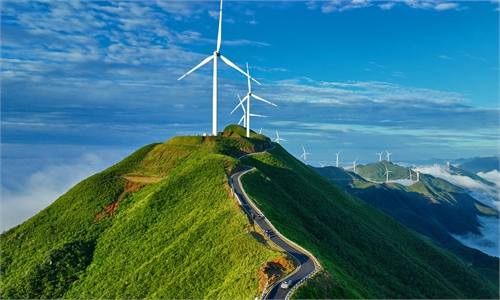China’s efforts in maintaining global food security extremely important for a stable, balanced, equitable world: UN food systems envoy

A farmer works on a rice farm along with his family members in Agatu village on the outskirts of Benue, Nigeria, on January 5, 2022. Photo: VCG
Editor's Note:The world is currently experiencing a global food crisis. China has repeatedly stressed the strategic importance of safeguarding the country's food security. Agnes Kalibata (Kalibata), the UN Secretary General's Special Envoy for the 2021 Food System's Summit and president of the Alliance for a Green Revolution in Africa, talked to Global Times (GT) reporter Wang Wenwen about the need to transform the global food system, how climate change affects food security, and China's role in tackling both.
GT: You are engaged in the global food system transformation. Why is it important?
Kalibata: It's really important that we transform the food system for two reasons. On the one hand, we have a lot of inequality in our food system. We have a lot of people who are not receiving enough food because a good diet is so expensive. Women and children are left out of the ability to have good food, especially in the [Global] South. We have to transform the food system to ensure that countries in the South can access food and facilities.
On the other hand, a lot of emissions that come from the food system contribute to climate change. We must ensure that countries in the North and West are reducing emissions coming from the food system so that we have a better world. Everything is interconnected. What happens in China does not just happen in China; it impacts Africa and the rest of the world. What happens in northern Europe impacts the rest of the world. So we are very interconnected. It's really important that we work together to resolve these problems.
GT: What do you think of China's role in joining hands with the world and maintaining global food security?
Kalibata: It's extremely important that we maintain global food security because there is no point in living in a world where part of the world is struggling, especially if we are partly responsible for that suffering.
I think we have a moral obligation to ensure food security. We have signed up for the Sustainable Development Goals (SDGs) and need to follow through on them. We have agreed globally that we have a responsibility to deal with the challenge of hunger. China is a good global nation, and a good global citizen has an obligation to contribute to this. That's why some of these efforts are extremely important for us to live in a stable, balanced and equitable world. So if it is anybody out there, a nation out there, that feels like they're a leader in anything we want to lead in the world, it starts with moral responsibility.
GT: What are the challenges in promoting food security?
Kalibata: Food security is impacted by climate change. Kenya has had a drought for six seasons without having production or yield. So that's how climate change affects the country. You see lots of floods in Mozambique and Malawi, where countries have had them for so many years. I didn't know about these things until climate change became a problem.
Then, cyclones now happen every year in Mozambique and Malawi. They kill people, they take away food security, and they make these governments weaker because it's really difficult to invest in this type of thing. The big problem is that adaptation finance is not working. Africa contributes less than 2 to 3 percent in general to climate change. But Africa is experiencing so much climate change because there's a lot that's happening in the rest of the world. So that's how it impacts one thing that happens in another part of the world. Mostly, what we know from the recent past is negative, whether it is COVID-19, the Russia-Ukraine crisis or climate change.
I know people don't like to talk about the difficulties and challenges of climate change. We all like to talk about it in a nice way. The truth is, it's actually killing people, and we need to do something about it. Look at the heat this summer. It's not killing people only in Africa. It is killing people across the world. And we just need to stay within 1.5 C. So that is one of the things that the West can do. Climate change is not coming as a result of poor countries. It's coming as a result of industrialized countries that are taking too much and pumping too much into the environment.
Number 2 is that they could do better with adaptation finance. We agreed a long time ago that part of this problem - how you keep poor countries moving along despite climate change - is to ensure that adaptation finance is available. Now adaptation finance is not working, for every $83 of adaptation finance, African countries get $1 dollar, and $82 goes to the North to fix problems with climate change. But how about African countries and countries in the South that have nothing to do with climate change and have no ability to tackle it?
GT: How would you comment on China's efforts to tackle global climate change?
Kalibata: Now many cars on the road are electric, which is extremely important. Removing gas and coal is extremely important. I've also seen a lot of solar-powered energy and capability being put in place. That is very good. We need to stop emissions because the more we emit, the more we get into the rim of passing 1.5 C, and the more we get affected. China has the capability to cope. The West has the capability to cope, but Africa has very little capability to cope. Many countries in the South have variable capabilities to cope. That's why we need China and other countries to reduce or impact climate change.
GT: US Climate Envoy John Kerry is heading to China for talks on climate change. What do you think of the cooperation between China and the US in tackling climate change?
Kalibata: I think it's a good development that the US and China are engaging. I think it's a great opportunity, especially to deal with climate exchange issues. We want China and the US to do the right thing, especially from a climate change perspective.
GT: Since the Belt and Road Initiative was proposed, African countries have participated actively. In your eyes, why does this China-initiated project receive wide support from the international community, especially developing countries?
Kalibata: A number of developing countries today need support because we've just come out of COVID-19, we are still undergoing the cost of living crisis, and we are still undergoing climate change. So we need to come through on the SDGs. Most of these programs that are geared toward securing development and sharing resources ensure that countries have access to resources that can ensure development.
China stepping up and coming forward with this initiative means that advanced development is all on the way because development is needed, especially because of climate change.
We engage in the Comprehensive African Agricultural Development Program and the investments across countries that will advance it. We want to encourage different partners on the African continent to support food security, as well as climate change and adaptation.
GT: You attended the Global Shared Development Action Forum. What is your understanding of the China-proposed Global Development Initiative (GDI)?
Kalibata: It's in China's interest to contribute to sustainable development, but China has also contributed to all these multilateral issues. China is leading the nation's development, but it is also coming through on many things that we don't. So I think the GDI is a big opportunity for China to engage and contribute to global issues.
I guess we really need to focus on why we are not achieving the SDGs. The SDGs are beyond what individual countries can do for themselves. It's about multilateral partnerships. It is good to see the launch of the GDI. China has been part of the GDI and is adding more weight to the initiative that supports the achievement of the SDGs. This is a very good direction.

